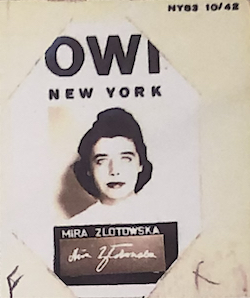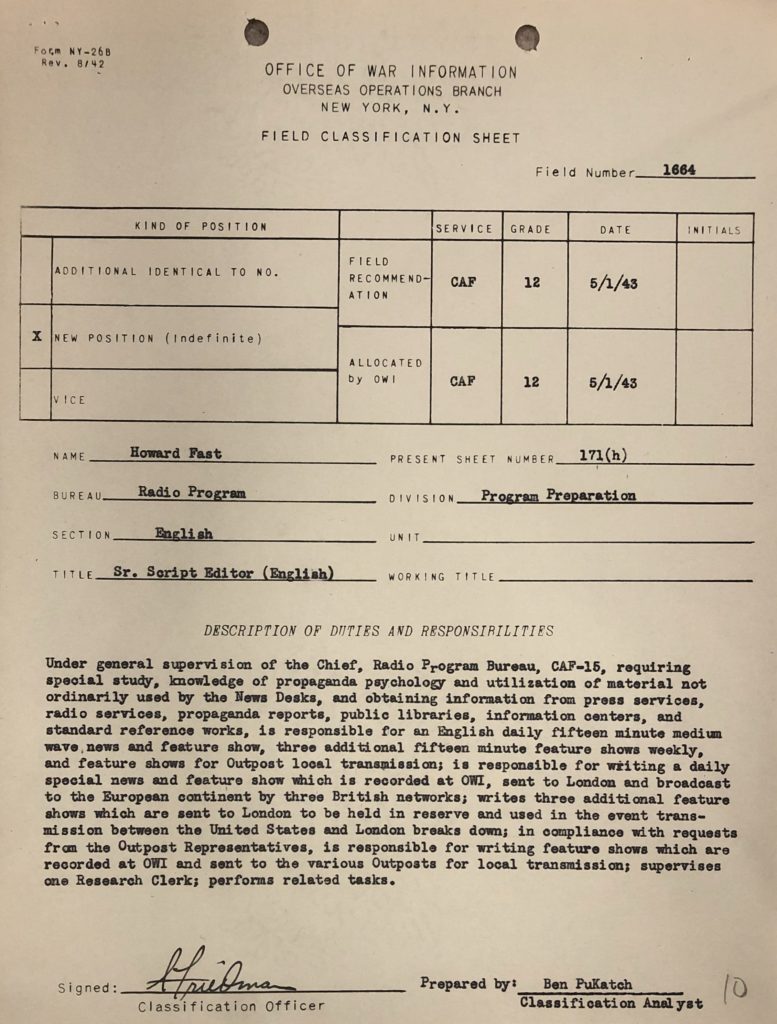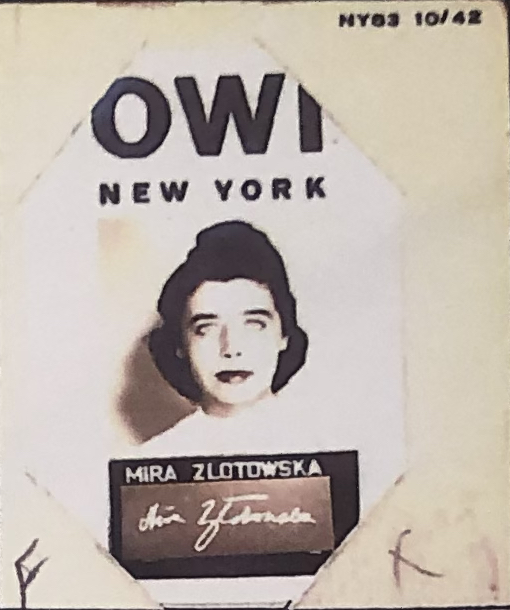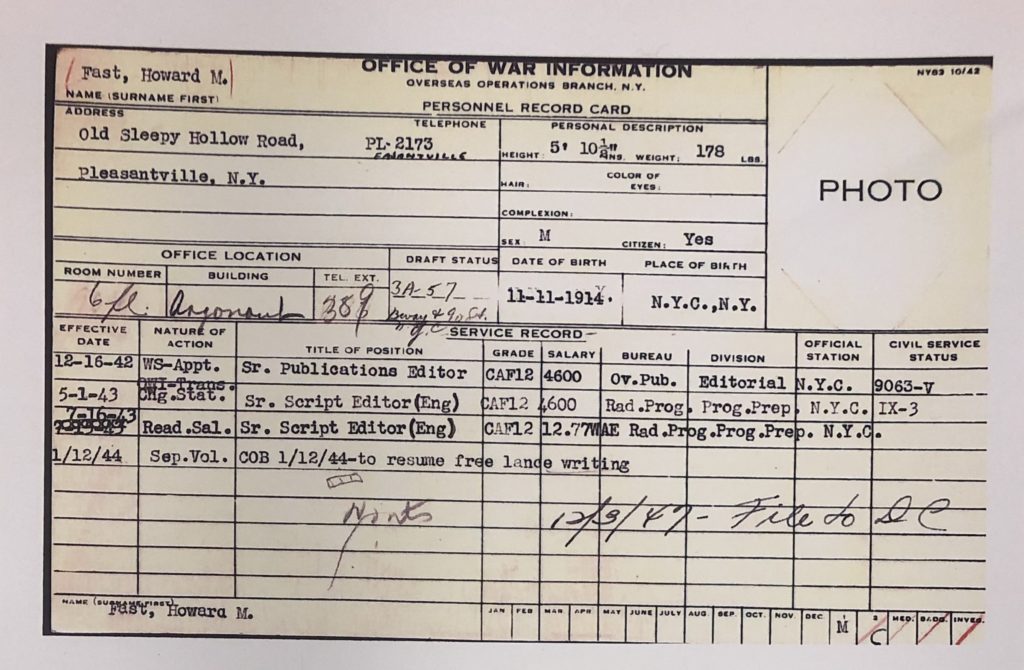By Ted Lipien for Cold War Radio Museum
Soviet influence at Voice of America during World War II — documents and analysis

Soviet influence at WWII Voice of America
From VOA to communist regime journalist
Choices of VOA’s pro-Soviet journalist
VOA journalist marries Communists
A pro-Soviet propagandist at OWI and VOA
VOA communist partner Stefan Arski
Pro-Soviet collaborators at OWI and VOA
A VOA friend of Stalin Peace Prize winner
Among Soviet sympathizers at VOA
Critics of her communist influence at VOA
Was she VOA’s communist ‘Mata Hari’?
Mira Złotowska, later known as Mira Michałowska who published books and articles in English as Mira Michal and used several other pen names, was one of many radically left-wing journalists who during World War II worked in New York on Voice of America (VOA) U.S. government anti-Nazi radio broadcasts but also helping to spread Soviet propaganda and censoring news about Stalin’s atrocities. While not the most important among pro-Soviet propagandists at the Voice of America during the war, Michałowska later went back to Poland, married a high-level communist diplomat and for many years supported the regime in Warsaw with soft propaganda in the West while also helping to expose Polish readers to American culture through her magazine articles and translations of American authors. One of the American writers she translated was her former VOA colleague and friend, the 1953 Stalin Peace Prize winner Howard Fast who in 1943 played an important role as VOA’s chief news writer. Despite today’s Russian attempts to undermine journalism with disinformation, the Voice of America has never officially acknowledged its mistakes in allowing pro-Soviet propagandists to take control of its programs for several years during World War II. Eventually, under pressure from congressional and other critics, the Voice of America was reformed in the early 1950s and made a contribution to the fall of communism in East-Central Europe.
Howard Fast – VOA – Stalin Peace Prize
While journalists from Poland, Mira Złotowska ( later Michałowska) and Stefan Arski, Adolf Hoffmeister, a journalist from Czechoslovakia, and other refugees from Europe worked on the foreign language desks in the Overseas Division of the U.S. Office of War Information (OWI), where World War II Voice of America (VOA) radio broadcasts were produced from 1942 to 1945, the chief English news writer and news director for the entire Voice of America was Howard Fast. Some of the others, including Złotowska, Arski and Hoffmeister, went back to Europe after the war to work for the communist regimes in their countries. Howard Fast, after leaving VOA in 1944, joined the Communist Party USA, was a reporter and editor at the party’s newspaper The Daily Worker. In 1953, Fast was awarded the Stalin International Peace Prize worth about $235,000 in today’s dollars. While being in charge of the radio newsroom for most of 1943, Fast admitted later that his source of news about Russia was the Soviet Embassy in Washington. He also wrote in his book Being Red that he eliminated from Voice of America broadcasts news unfavorable to the Soviet Union, labeling such information as anti-Soviet propaganda.
I established contact at the Soviet embassy with people who spoke English and were willing to feed me important bits and pieces from their side of the wire. I had long ago, somewhat facetiously, suggested “Yankee Doodle” as our musical signal, and now that silly little jingle was a power cue, a note of hope everywhere on earth…
1
In answering the question on his U.S. federal government job application what kind of work he preferred, Howard Fast wrote, “writing propaganda.” Whether he was the first person who had suggested Yankee Doodle as VOA’s station identification tune could not be confirmed. According to one description on the official Voice of America website, VOA adopted its “Yankee Doodle” station identification tune when John Chancellor was the VOA Director between 1965 and 1967 and had used earlier “Columbia, Gem of the Ocean” as its musical ID. During World War II, OWI radio programs were broadcast under various names and used various station identification themes. Fast may or may not have proposed and used “Yankee Doodle” during his time with VOA, but he was in charge of writing and editing some of the Voice of America’s most important news programs, which he helped to fill with Soviet propaganda and disinformation.

DESCRIPTION OF DUTIES AND RESPONSIBILITIES
Under general supervision of the Chief, Radio Program Bureau, CAP-15, requiring special study, knowledge of propaganda psychology and utilization of material not ordinarily used by the News Desks, and obtaining information from press services, radio services, propaganda reports, public libraries, information centers, and standard reference works, is responsible for an English daily fifteen minute medium wave news and feature show, three additional fifteen minute feature shows weekly, and feature shows for Outpost local transmission; is responsible for writing a daily special news and feature show which is recorded at OWI, sent to London and broadcast to the European continent by three British networks; writes three additional feature shows which are sent to London to be held in reserve and used in the event transmission between the United States and London breaks down; in compliance with requests from the Outpost Representatives, is responsible for writing feature shows which are recorded at OWI and sent to -the various Outposts for local transmission; supervises one Research Clerk; performs related tasks.
In his 1990 memoir Being Red, Fast admitted that while he had work at VOA, he had a brief romance with his assistant despite being married. He dismissively later wrote in his book about his former romantic partner as “my Bennington typist” who “didn’t improve her typing.” He also claimed that in effect he was able to direct the entire Voice of America news operation.
Elmer Davis [OWI director] had offered me additional staff, but that was not what I needed; the entire organization was in a sense my staff. I could have anything I wanted just by asking.
2
Fast wrote that VOA director John Houseman maintained an avuncular attitude toward him. Fast felt that his work was of great importance in the fight against Fascism.
Even today, forty-eight years later, my eyes fill with tears at that wonderful line: This is the Voice of America; this is the voice of mankind’s hope and salvation, the voice of my wonderful, beautiful country, which will put an end to fascism and remake the world.
3
The State Department, backed by the U.S. Military Intelligence, and with approval from President Roosevelt’s close friend and foreign policy advisor, Under Secretary of State Sumner Welles, refused to give U.S. passports to both Howard Fast and John Houseman for their planned government travel abroad on VOA business.
4This State Department action forced John Houseman’s resignation in June 1943 from his full-time director’s position and, after some part-time work for OWI, led to his final departure from the agency in December 1943. His was officially a voluntary resignation, but it was obvious that a U.S. government official who would not be able to travel abroad and was suspected of hiring Communists could not continue working in his position as the director of the Voice of America. The same was true for Howard Fast and his position in the VOA newsroom. He left his chief news writer’s job at the Voice of America in January 1944.
In his 1953 testimony before a congressional committee, Fast claimed memory lapses and took advantage of imprecise questions to avoid describing in any detail his job and his patrons and co-workers at the Voice of America. He had no problems recalling the same information in great detail for his Being Red memoir published in 1990.
Gerarld Sorin’s biography of Fast, Howard Fast: Life and Literature in the Left Lane, leaves no doubt that Howard Fast played a key role in writing news for Voice of America broadcasters, many of whom were pro-Moscow Communists or at least Soviet sympathizers .
“Fast wrote concise, dramatic pieces for broadcast, which were read by actors transmitting via BBC into Nazi-dominated Europe. … Eighteen of the twenty-three actors available for narration were Communists.
5Fast was not just ‘impressed’ by them, he said, but ‘overwhelmed’ by his associates ‘knowledge’ and ‘sensitivity’.”
6
According to Fast, there was no third way between Fascism and Communism, but even while he was still writing news for VOA, American labor unions stopped their collaboration with the Office of War Information over complaints that pro-Soviet Communists were in charge of the VOA programs. The AFL-CIO, which refused to have anything to do with a Communist like Howard Fast, was hardly a Fascist organization.
7
Prison and blacklisting
When the pendulum swung from a near complete tolerance of Soviet interference to the paranoia during Senator Joseph McCarthy’s hunt for Communists who were by then already largely gone from the U.S. government, Fast served a brief prison term after being convicted in the 1950s on charges of contempt of Congress for refusing to reveal names of members in a Soviet front organization.
Fast was at the same time a talented, best-selling author of dozens of books, including Spartacus, which was made into the 1960 Hollywood movie directed by Stanley Kubrick and starring Kirk Douglas, Laurence Oliver and Jean Simmons. At the time of the film’s release, its screenwriter Dalton Trumbo was still blacklisted as one of the Hollywood Ten. Howard Fast was also blacklisted but was no longer a Communist Party member since 1956 or 1957. Trumbo was a Communist Party member from 1943 to 1948. He had left the Communist Party much earlier than Howard Fast. The blacklisting of former Communist Party members and suspected Soviet sympathizers in Hollywood came to its final end soon after the release of Spartacus.
The Voice of America management today (2019) in a way still continues to blacklist its former chief news writer Howard Fast for different reasons by refusing to admit that he had worked for the organization in an important position, was a protege of VOA’s first director John Houseman and spread Soviet propaganda and disinformation in his radio broadcasts transmitted to Europe. Fast’s undeniable claim to fame as a prolific and bestselling writer of more than 70 books has also been ignored by the VOA management, which in its November 2019 online “VOA Authors” presentation lists the current Voice of America director Amanda Bennett with the largest number of published books (six). Fast, but also Złotowska and Hoffmeister, all former Voice of America journalists had published a far greater number of books, more than all of the writers in the “VOA Authors” presentation put together. As the wife of a communist ambassador, Michałowska under her American pen name Mira Michał published one book in English in the United States in addition to her magazine articles for American readers and several bestselling books published in Poland. Even Arski, another former VOA journalist, had several of his anti-American propaganda books published by the communist regime in Warsaw.
For somewhat different reasons than the blacklisting in Hollywood in the 1950s, the blacklisting at VOA of most of its former pro-Soviet fellow travelers continues while others get a cult of personality treatment embarrassingly reminiscent of Soviet times. Such a persistent refusal to learn and acknowledge its own history of being deceived by Soviet propaganda makes the Voice of America particularly vulnerable to being again misled by Vladimir Putin’s far more sophisticated disinformation war being currently waged against many democratic nations.
Whatever Fast wrote or said as a writer of novels and Hollywood screenplays was well within his rights as an American citizen, but because of the abuses by the Office of War Information in attempting to spread Soviet propaganda at U.S. taxpayers’ expense not only abroad through Voice of America broadcasts but also to propagandize directly to Americans, the U.S. Congress eliminated in 1943 almost the entire budget for domestic propaganda and later passed the 1948 Smith-Mundt Act to restrict distribution of VOA and State Department programs in the United States while providing funding and encouraging educational exchanges with foreign countries and U.S. public diplomacy abroad. Some of these restrictions were lifted by Congress in the Smith-Mundt Modernization Act of 2012. The 1948 Smith-Mundt Act also imposed much stricter security clearances for Voice of America staff to minimize the risk of hiring Soviet and other foreign agents of influence and sympathizers, but these clearances have also been weakened.
Michałowska — a translator of Fast’s books
Mira Michałowska continued her friendship with Fast while he worked as a reporter editor for the Communist Party USA newspaper The Daily Worker. She translated into Polish Fast’s best-selling book Citizen Tom Paine and had it published in Poland in 1948 as Obywatel Tom Paine. The book had a second edition in 1952. Michałowska’s name as the translator of the book was listed as Jan Karen. She translated and published in Poland four more of Howard Fast’s novels and short stories under her translator’s pen name.
8
After World War II, Fast also became a bestselling American author in the Soviet Union during Stalin’s rule. He complained later that he had never received any royalties for his books translated into Russian and felt that the Stalin Peace Prize he received in 1953 was a just compensation for his books sold to hundreds of thousands of Russian readers.
Stalin International Peace Prize
In his memoir Being Red, Fast expressed no remorse for receiving and keeping the Stalin International Peace Prize awarded to him in 1953 several months after Stalin’s death.
The International Committee, headed by [French poet and longtime Communist Party member] Louis Aragon, awarded me the Stalin International Peace Prize. This consisted of a beautiful leather-bound diploma case, a gold medal, and $25,000 [about $235,000 in 2019 dollars although it is hard to determine with some precision how much money Fast received and whether he received it in rubles or dollars], which revered our slide to poverty. …and considering the hundreds of thousands of my books printed in the Soviet Union, for which no royalties had ever been paid, the $25,000 aroused no guilts for undeserved gratuities.
9
Even after leaving the Communist Party, Howard Fast was largely unrepentant and insisted that while at VOA he knew very little about Stalin and the Soviet Union. “We were a party of the United States,” Fast wrote about the Communist Party USA, failing to mention that for decades the Party’s leadership was receiving money from Moscow. In the 1990s, he still showed great pride about his key role as the first chief writer of VOA news, promoter of Russian propaganda via the Soviet Embassy in Washington and censor of “anti-Soviet and anti-Communist” information. It happened to be true information about Stalin’s genocidal crimes, such as the deaths of thousands of children deported with their parents to the Soviet Gulag. Other true news kept out of VOA broadcasts were the brutal executions of thousands of prisoners of war in Soviet captivity.
In Being Red, Fast proudly declared that he had kept such information out of VOA broadcasts.
As for myself, during all my tenure there [VOA] I refused to go into anti-Soviet or anti-Communist propaganda.
10
Fast also condemned post-war U.S. government efforts to stop further Soviet aggression and to counter Soviet propaganda. These actions included the creation of Radio Free Europe (RFE) and Radio Liberty (RL) to broadcast uncensored news and commentary to Eastern Europe and the Soviet Union, but Fast wrote that Americans were also being targeted by the U.S. government.
…starting with the end of World War Two, the American establishment was engaged in a gigantic campaign of anti-Communist hatred and slander, pouring untold millions into this campaign and employing an army of writers and publicists in an effort to reach every brain in America.
11
Historical assessment
The enslavement by Stalin’s Russia of millions of people at the end of World War II proved that concealing the truth in the battle for the truth, and lying about it, had lead to disastrous results.
Unsurprisingly, Howard Fast’s VOA newscasts were not well received by refugees fleeing Communist repression, including family members of Gulag prisoners lucky enough to be alive and able to listen to VOA broadcasts during the war, mostly those who had escaped from under Nazi and Soviet occupation. Howard Fast had helped to spread Soviet propaganda lies to wives, children and other family members of thousands of military officers and other Polish POWs secretly executed on the orders of Stalin and the Soviet Politburo in the 1940 Katyn Massacre. Anti-Nazi and anti-Communist Yugoslav partisans, democratic French, Italians, Czechs, Slovaks, Hungarians, Romanians, Bulgarians, Greeks and anybody else who understood the danger of Communism and Soviet totalitarianism would have been equally appalled by Fast’s promotion of Stalin in VOA broadcasts as a friend of democracy and a guarantor of peace and progress. Even after Howard Fast was gone from VOA, its broadcasts continued to reflect Soviet propaganda for a few more years, as they constantly did during World War II.
In his post-White House years memoirs published in 1965, former President Dwight Eisenhower briefly alluded to VOA’s wartime record of journalistic collusion with Russia. As a military leader during World War II, he must have been still upset to have mentioned it years later during the Cold War with the Soviet Union when VOA was already playing a useful although still less than fully effective role in countering Soviet propaganda. General Eisenhower had been actively engaged in earlier efforts to create Radio Free Europe and Radio Liberty as more effective media outlets against the Soviet Union. His critical comment appeared in a footnote to a paragraph in which he expressed his own concerns with what he saw as Voice of America’s unethical journalism in support of partisan political advocacy in at least one foreign policy incident during his own administration.
During World War II the Office of War Information had, on two occasions in foreign broadcasts, opposed actions of President Roosevelt; it ridiculed the temporary arrangement with Admiral Darlan in North Africa and that with Marshal Badoglio in Italy. President Roosevelt took prompt action to stop such insubordination.
12
In his biography of Howard Fast, American historian Gerald Sorin provided an analysis of how easily Soviet propaganda corrupted writers and journalists living and working in the 20th century.
They failed to acknowledge the human inclination to abuse power, ignored horrific consequences, and often rationalized Soviet barbarities as historically necessary. One of the benefits of examining the life of Howard Fast is that it enables us to make yet one more exploration into the hoary question of how this could have happened.
13
Professor Sorin’s observations could just as well be applied to other early Voice of America journalists like Mira Złotowska or to those among VOA reporters today who present American Communist Angela Davis as a defender of human rights and write positively about Che Guevara without mentioning his responsibility for multiple murders of political opponents, including many innocent individuals.
Fast eventually left the Communist Party in 1956 or 1957, after Soviet leader Nikita Khrushchev revealed Stalin’s crimes, but he remained unapologetic about his promotion of Soviet “news” in VOA’s World War II broadcasts. His memoir Being Red, published in 1990, is a testimony to his journalistic naïveté, arrogance and ability to manipulate readers into believing that to fight Fascism one had to become a Communist. For a journalist, he was supremely naive. In a 1998 radio interview, he described how staff members of the Communist Daily Worker cried when they read Khrushchev’s speech for the first time:
“And we heard this speech, and many of us wept. Because we did not know, and would not believe, the truth about the Soviet Union.
14
We had erected a Socialist state to our beliefs and to our dreams, and this for us was the Soviet Union.”
Whether Fast’s friend, co-worker at the Voice of America and Polish translator of his books ever joined the Communist Party in Poland is not clear, but she was the wife of a high-ranking communist diplomat, remained loyal to the regime in Warsaw and promoted its soft power propaganda abroad and at home for much longer than the duration of Howard Fast’s official membership in the Communist Party USA.
Ted Lipien was Voice of America acting associate director in charge of central news programs before his retirement in 2006. In the 1970s, he worked as a broadcaster in the VOA Polish Service and was the service chief and foreign correspondent in the 1980s during Solidarity’s struggle for democracy in Poland.
Notes:
- Howard Fast, Being Red (Boston: Houghton Mifflin Company, 1990), 18-19. ↩
- Howard Fast, Being Red (Boston: Houghton Mifflin Company, 1990), 18. ↩
- Howard Fast, Being Red (Boston: Houghton Mifflin Company, 1990), 18. ↩
- Under Secretary of State Sumner Welles April 6, 1943 memorandum to Marvin H. McIntyre, Secretary to the President with enclosures, Franklin D. Roosevelt Library and Museum Website, Box 77, State – Welles, Sumner, 1943-1944, http://www.fdrlibrary.marist.edu/_resources/images/psf/psfb000259.pdf. The Welles memorandum is also accessible at: State – Welles, Sumner, 1943-1944, From Collection: FDR-FDRPSF Departmental Correspondence, Series: Departmental Correspondence, 1933 – 1945 Collection: President’s Secretary’s File (Franklin D. Roosevelt Administration), 1933 – 1945, National Archives Identifier: 16619284, https://catalog.archives.gov/id/16619284. Also see: Ted Lipien, “First VOA Director was a pro-Soviet Communist sympathizer, State Dept. warned FDR White House,” Cold War Radio Museum, May 4, 2018, http://www.coldwarradiomuseum.com/state-department-warned-fdr-white-house-first-voice-of-america-director-was-hiring-communists/. ↩
- Fast, Campenni interview, April 16, 1968; Fast on CBS Nightwatch, December 7, 1990. ↩
- Gerald Sorin, Howard Fast: Life and Literature in the Left Lane (Bloomington: Indiana University Press, 2012). ↩
- In 1943, American labor federations, the AFL and CIO, dominated by members of the Democratic Party, broke their collaboration with the Voice of America in producing programs about American labor because VOA broadcasters were communists and the mainstream American labor organizations were opposed to communism. The controversy became public and was described on the floor of the House of Representatives on November 4, 1943 by Rep. Richard B. Wigglesworth (R-Massachusetts) who was later U.S. Ambassador to Canada. “MR. WIGGLESWORTH. I call as witness in this connection the American Federation of Labor and the Congress of Industrial Organizations. I refer specifically to an article appearing recently in the World-Telegram. The gentleman from New York [Mr FISH] put the article in the CONGRESSIONAL RECORD, and you will find it in the RECORD of Tuesday, October 12, 1943, I shall not reinsert it, but here is the original of that article. You will notice the headlines. The leading headline is ‘Unions label O. W. I. radio program communism.’ That article very briefly asserts that the American Federation of Labor and the Congress of Industrial Organizations made a joint protest over 10 months ago to Elmer Davis to the effect that the O. W. I. overseas branch had been regularly broadcasting Communist propaganda in its daily short-wave radio programs. It states further that after months of futile negotiation the A. F. of L. and C. I. O. liquidated their labor short-wave bureau set up to collect nonfactual news to be turned over to O. W. I. as broadcast material.” ↩
- Katarzyna Batora, “MICHAŁOWSKA Mira,” SŁOWNIK TŁUMACZY, Nowa Panorama Literature Polskiej, http://nplp.pl/artykul/michalowska-mira/. ↩
- Howard Fast, Being Red (Boston: Houghton Mifflin Company, 1990), 318. ↩
- Howard Fast, Being Red (Boston: Houghton Mifflin Company, 1990), 23. ↩
- Howard Fast, Being Red (Boston: Houghton Mifflin Company, 1990), 27. ↩
- Dwight D. Eisenhower, The White House Years: Waging Peace 1956-1961 (Garden City: Doubleday & Company, 1965) 279. ↩
- Gerald Sorin, Howard Fast: Life and Literature in the Left Lane (Bloomington: Indiana University Press, 2012), 19. ↩
- Pacifica Radio’s Democracy Now, April 8, 1998, “Interview with Howard Fast,” https://www.trussel.com/hf/democnow.htm. ↩





Add Comment